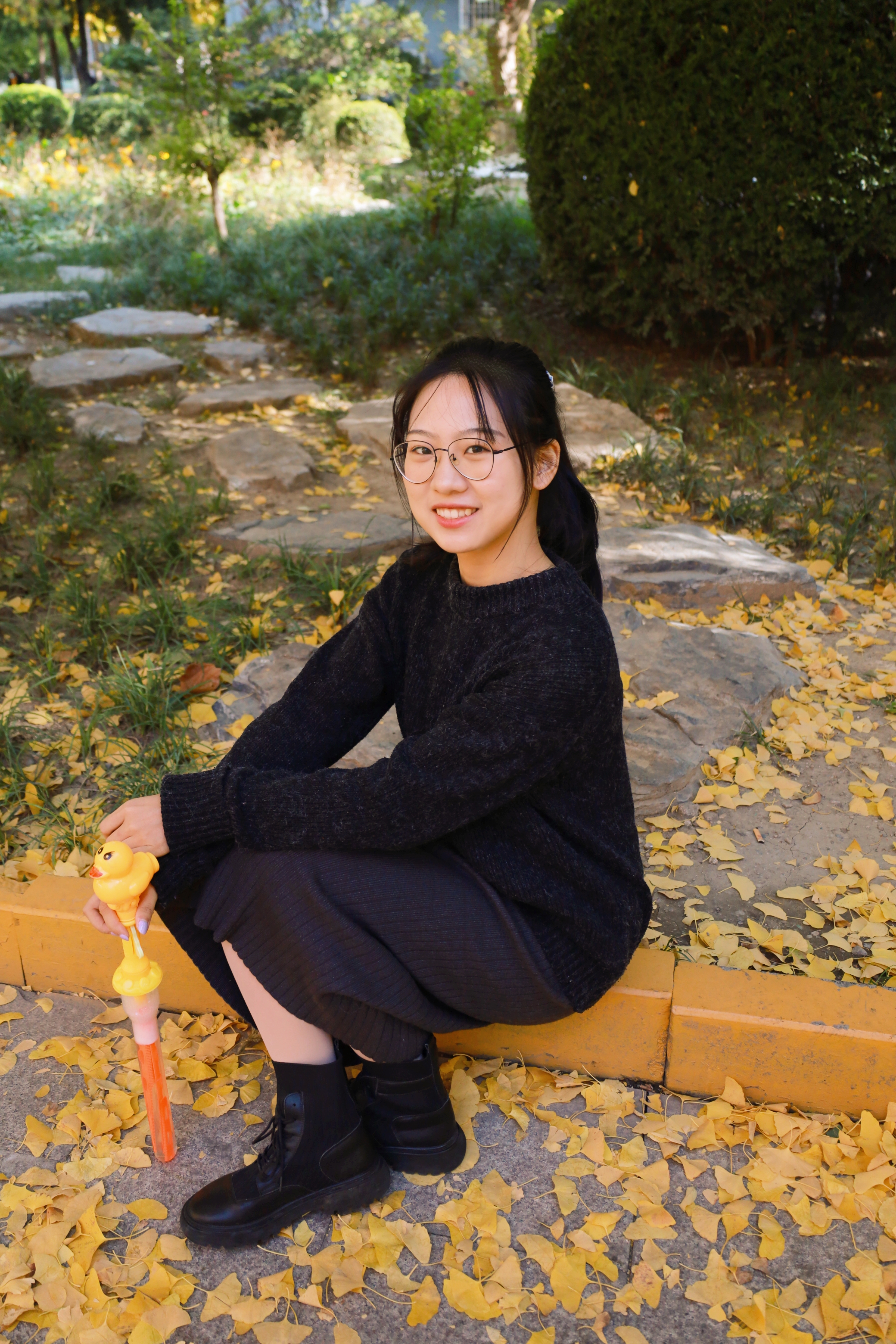Hi, I'm Zifeng (Lauren) Liu.
A
Self-driven, quick starter, and enthusiastic researcher with a strong passion for leveraging AI and data mining to improve educational outcomes.
About

I am currently a third-year Ph.D. student in Educational Technology at the College of Education, University of Florida. I hold a Master's degree in Computer Software and Theories from Beijing Normal University and a Bachelor's degree in Computer Science from Beijing Technology and Business University. My research interests lie at the intersection of educational data mining, learning analytics, and the application of artificial intelligence in education, with a particular focus on computer science education.
I am looking for collaborative opportunities to work on innovative projects, engage in meaningful research, and foster professional growth and knowledge exchange. In my free time, I enjoy traveling, listening to music, hiking, and, of course, catching up on some well-deserved sleep.
Projects

A flow-based programming platform designed for elementary students.
- Zifeng Liu, Shan Zhang, Maya Israel, Robert Smith, Wanli Xing, and Victor Minces*. 2025. Engaging K-12 Students with Flow-Based Music Program- ming: An Experience Report on Its Impact on Teaching and Learning. In Proceedings of the 56th ACM Technical Symposium on Computer Science Edu- cation V. 1 (SIGCSE TS 2025), February 26-March 1, 2025, Pittsburgh, PA, USA. ACM, New York, NY, USA, 7 pages. https://doi.org/10.1145/3641554.3701902

An integrated data science foundations course built on mathematical logic.

A project dedicated to ensuring equitable and unbiased outcomes in online learning systems.
- Liu, Z., Jiao, X., Li, C., & Xing, W. (2024, July). Fair Prediction of Students' Summative Performance Changes Using Online Learning Behavior Data. Proceedings of the 17th International Conference on Educational Data Mining, 686--691. https://doi.org/10.5281/zenodo.12729918
- Liu, Z., Xing, W., & Li, C. (2024, July). Explainable analysis of AI-generated responses in online learning discussions. In Educational Data Mining 2024 Workshop: Leveraging Large Language Models for Next-Generation Educational Technologies. https://doi.org/10.13140/RG.2.2.24309.38881

A project applying Generative AI to support online K-12 STEAM education.
- Zifeng Liu, Xinyue Jiao, Wanli Xing, and Wangda Zhu. 2025. Detecting AI-Generated Pseudocode in High School Online Pro- gramming Courses Using an Explainable Approach. In Proceedings of the 56th ACM Technical Symposium on Computer Science Education V. 1 (SIGCSE TS 2025), February 26-March 1, 2025, Pittsburgh, PA, USA. ACM, New York, NY, USA, 7 pages. https://doi.org/10.1145/3641554.3701942.
- Song, Y., Kim, J., Liu, Z., Li, C., & Xing, W. (2024). Students' Perceived Roles, Opportunities, and Challenges of a Generative AI-powered Teachable Agent: A Case of Middle School Math Class. arXiv preprint arXiv:2409.06721.
Publication
Journal Papers
- Liu, Z., Xing, W., Jiang, Y., Li, C., Kim, T., & Li, H. (2025). Leveraging contrastive learning to improve group and individual fairness in predictive analytics for online learning. Journal of Computing in Higher Education. https://doi.org/10.1007/s12528-025-09468-y
- Liu, Z., Xing, W., Jiao, X., & Li, C. (2025). Exploring fairness and explainability in LLM-generated support for online learning discussion forums. Journal of Learning Analytics, 1–26. https://doi.org/10.18608/jla.2025.8885
- Liu, Z., Xing, W., Li, C., Zhang, F., Li, H., & Minces, V. (2025). Exploring automated assessment of primary students’ creativity in a flow-based music programming environment. Journal of Learning Analytics, 12(2), 83–104. https://doi.org/10.18608/jla.2025.8835
- Liu, Z., Xing, W., Jiao, X., et al. (2025). What are the differences between student and ChatGPT-generated pseudocode? Detecting AI-generated pseudocode in high school programming using explainable machine learning. Education and Information Technologies. https://doi.org/10.1007/s10639-025-13385-z
- Liu, Z., Xing, W., Ngo, B., Jiao, X., Jiang, S., & Li, C. (in press). Engagement patterns of struggling students with AI teachable agents in mathematics learning. Scientific Reports.
- Song, Y., Kim, J., Liu, Z., Li, C., & Xing, W. (2025). Students’ perceived roles, opportunities, and challenges of a generative AI-powered teachable agent: a case of middle school math class. Journal of Research on Technology in Education, 1–19. https://doi.org/10.1080/15391523.2024.2447727
- Xing, W., Song, Y., Li, C., Liu, Z., Zhu, W., & Oh, H. (2025). Development of a generative AI-powered teachable agent for middle school mathematics learning: a design-based research study. British Journal of Educational Technology, 1–20.
- Song, Y., Kim, J., Xing, W., Liu, Z., Li, C., & Oh, H. (2025). Elementary school students’ and teachers’ perceptions toward creative mathematical writing with Generative AI. Journal of Research on Technology in Education, 1–23. https://doi.org/10.1080/15391523.2025.2455057
- Xing, W., Fang, Z., Zhang, H., Kamiyama, T., Liu, Z., & Kim, T. (2025). Making the ‘mathematics register’ accessible to students: an exploratory study of two teachers’ discourse in an online lesson on polynomial expressions. Language and Education, 1–24. https://doi.org/10.1080/09500782.2025.2542861
- Li, H., Xing, W., Zhu, W., Zhang, S., & Liu, Z. (2025). Should educational AI models include gender attribute? Explaining the why based on environmental psychology course with gender imbalance. Journal of Computing in Higher Education.
- Zhu, W., Xing, W., Kim, E. M., Li, C., Wang, Y., Yang, Y., & Liu, Z. (2025). Integrating image-generative AI into conceptual design in computer-aided design education: Exploring student perceptions, prompt behaviors, and artifact creativity. Educational Technology & Society, 28(3), 166-183. https://doi.org/10.30191/ETS.202507_28(3).SP11
- Liu, E., Cai, S., Liu, Z., & Liu, C. (2023). WebART: Web-based augmented reality learning resources authoring tool and its user experience study among teachers. IEEE Transactions on Learning Technologies, 16(1), 53–65. https://doi.org/10.1109/TLT.2022.3214854
- Cai, S., Liu, Z., Liu, C., & others. (2022). Effects of a BCI-based AR inquiring tool on primary students’ science learning: A quasi-experimental field study. Journal of Science Education and Technology, 31, 767–782. https://doi.org/10.1007/s10956-022-09991-y
Conference Papers
- Kim, T., Liu, Z., Xing, W., Li, H., & Oh, H. (2025, June). Emotional dynamics in asynchronous math discussions: Analyzing the impact of negative emotions on learning outcomes. In Proceedings of the 2025 International Conference of the Learning Sciences (ICLS 2025). International Society of the Learning Sciences (ISLS). June 10–13, Finland.
- Li, H., Xing, W., Zhu, W., Li, C., Lyu, B., Liu, Z., & Heffernan, N. (accepted). Leveraging multi-modality and collaborative filtering for supporting automatic scoring in mathematics education. In Proceedings of the 26th International Conference on Artificial Intelligence in Education (AIED 2025).
- Li, H., Xing, W., Lyu, B., Zhu, W., Liu, Z., & Li, H. (accepted). An automated aesthetic assessment framework of mathematical story images validated by click counts. In Proceedings of the 18th ACM Conference on Learning@ Scale (L@S 2025).
- Oh, H., Liu, Z., & Xing, W. (2025). Do actions speak louder than words? Unveiling linguistic patterns in online learning communities using cross recurrence quantification analysis. In Proceedings of the 15th International Conference on Learning Analytics and Knowledge (LAK2025).
- Li, H., Xing, W., Li, C., Zhu, W., Lyu, B., Zhang, F., & Liu, Z. (2025, March). Who Should Be My Tutor? Analyzing the Interactive Effects of Automated Text Personality Styles Between Middle School Students and a Mathematics Chatbot. In Proceedings of the 15th International Conference on Learning Analytics and Knowledge (LAK2025).
- Liu, Z., Zhang, S., Israel, M., Smith, R., Xing, W., & Minces, V. (2025, Feb). Engaging K-12 students with flow-based music programming: An experience report on its impact on teaching and learning. In Proceedings of the 56th ACM Technical Symposium on Computer Science Education (SIGCSE TS 2025), February 26–March 1, 2025, Pittsburgh, PA, USA.
- Liu, Z., Jiao, X., Xing, W., & Zhu, W. (2025, Feb). Detecting AI-generated pseudocode in high school online programming courses using an explainable approach. In Proceedings of the 56th ACM Technical Symposium on Computer Science Education (SIGCSE TS 2025), February 26–March 1, 2025, Pittsburgh, PA, USA.
- Liu, Z., Xing, W., Zhang, F., & Li, C. (2025, March). A visual programming approach to enhance spatial computational thinking skills in upper-elementary students [Poster presentation]. The 15th International Learning Analytics & Knowledge Conference (LAK2025), Dublin, Ireland.
- Jiao, X., Huang, H., Liu, Z., Cai, S., & Fan, Z. (2025). Beyond the screen: Enhancing augmented reality collaborative inquiry with social scripts. In Proceedings of the 25th IEEE International Conference on Advanced Learning Technologies (ICALT 2025), Changhua, Taiwan. IEEE. [Best Full Paper Award]
- Liu, Z., Song, Y., Yang, Q., Xing, W., & Guo, J. (2025, June). Exploring the Impact of a Simulation-Based Learning Tool on Undergraduate Quantum Computing Education. In 2025 ASEE Annual Conference & Exposition.
- Liu, Z., Zhang, S., Xing, W., Minces, V., Israel, & Barron, A. (2025, June). A NSF ITEST Program: Integrating Music and Flow-Based Programming Builds Teachers’ Confidence in Computer Science. In 2025 ASEE Annual Conference & Exposition.
- Liu, Z., Monteith, B., Chao, J., Wiedemann, K., Fofang, J. B., Li, L., Ma, D., Mohamed, R., Mondol, A., Jo, Y., Fleetwood, A., Lipien, L., Zhang, Y., & Xing, W. (2025, February 17–19). Using entropy analysis to explore student engagement in an online high school data science course. Presented at DSE-K12 Conference 2025, Hyatt Regency San Antonio Riverwalk, San Antonio, TX, USA.
- Liu, Z., Guo, R, Song, Y., & Xing, W. (2024). WIP: Understanding students’ in-video dropout behavior in large online math learning platform. In Proceedings of 2024 IEEE Frontiers in Education (FIE 2024), Oct 13–16, 2024, Washington, D.C., USA.
- Liu, Z., Jiao, X., Li, C., & Xing, W. (2024, July). Fair Prediction of Students' Summative Performance Changes Using Online Learning Behavior Data. In Proceedings of the 17th International Conference on Educational Data Mining (EDM 2024) (pp. 686-691).
- Liu, Z., Xing, W., & Li, C. (2024, July). Explainable analysis of AI-generated responses in online learning discussions. In Educational Data Mining 2024 Workshop: Leveraging Large Language Models for Next-Generation Educational Technologies. https://doi.org/10.13140/RG.2.2.24309.38881
- Liu, Z., Guo, R., Jiao, X., Gao, X., Oh, H., & Xing, W. (2024, June). How AI Assisted K-12 Computer Science Education: A Systematic Review. In 2024 ASEE Annual Conference & Exposition.
- Oh, H., Guo, R., Xing, W., Liu, Z., Song, Y., & Li, C. (2024, June). The Seamless Integration of Machine Learning Education into High School Mathematics Classrooms. In 2024 ASEE Annual Conference & Exposition.
- Jiao, X., Liu, Z., Zhou, H., & Cai, S. (2022, July). The Effect of Role Assignment on Students’ Collaborative Inquiry-based Learning in Augmented Reality Environment. In Proceedings of the 2022 IEEE International Conference on Advanced Learning Technologies (ICALT 2022) (pp. 349-351). IEEE.
- Feng, Z., Gong, C., Jiao, X., Liu, Z., & Cai, S. (2022, July). The Effects of AR Learning Environment to Preschool Children’s Numerical Cognition. In Proceedings of the 2022 IEEE International Conference on Advanced Learning Technologies (ICALT 2022) (pp. 352-356). IEEE.
- Liu, Z., Jiao, X., & Cai, S. (2021, April 4). Effects of augmented reality on students' online physics learning. Paper presented at the 2021 Annual Meeting of the American Educational Research Association (AERA), Virtual Conference. Retrieved August 25, 2022, from the AERA Online Paper Repository.
- Jiao, X., Liu, Z., & Cai, S. (2020, November 23–27). Impact of embedded cognitive scaffolding of augmented reality technology on elementary school students' science learning. Paper presented at the 28th International Conference on Computers in Education (ICCE 2020), Virtual Conference. [Best Paper Nominee]
- To be updated.
Patent
- Cai, S., Liu, Z., & Zhang, Y.. (2023). A grid-based self-attention facial expression recognition method using supervised contrastive learning. (Patent pending).
- Cai, S., Liu, Z., Changhao Liu, & Haitao Zhou. (2021). A non-invasive brain-computer interface-based attention feedback method (Patent No. ZL 2021 1 1283053.5).
- To be updated.
Education

Gainesville, Florida, USA
Program of Philosophy in Curriculum and Instruction
Specialization: Educational Technology
Advisor: Dr. Wanli Xing
Lab: Advanced and Inclusive Computing for Education (AICE) Lab
- Quantitative Foundations of Educational Research
- Quantitative Research Methods in Education
- Current Issues and Trends in Computer Science Education
- Emerging Technologies in Learning and Education
- Human-Computer Interaction (HCI) and the Learner
- Designing Integrated Media Environments
Relevant Coursework:
- Vernice Law Hearn Scholarship (2025-2026): $2000
Honors/Awards:

Beijing, China
Degree: Master of Computer Software and Theories
Advisor: Dr. Su Cai
Lab: VR/AR + Education Lab
- First Prize of Excellent graduate Student Scholarship (2020-2021,2021-2022)
- Outstanding Freshman Scholarship (2020)
- Excellent Individual of Summer Volunteer Teaching Program of BNU (2022)
Honors/Awards:

Beijing, China
Degree: Bachelor of Computer Science and Technology
Advisor: Dr. Yi Chen and Dr. Zhongming Han
Lab: Beijing Key Laboratory of Big Data Technology for Food Safety
- Excellent Graduate of Beijing (2020, top 5%)
- National Scholarship of China (2018-2019, top 0.2%)
- Headmaster Scholarship of BTBU (2018-2019, top 0.3%)
- Outstanding Student Scholarship of BTBU (2018, 2019)
- Student Leadership Award of BTBU (2017-2018)
- National Scholarship for Encouragement of China (2016-2017, 2017-2018)
Honors/Awards:
